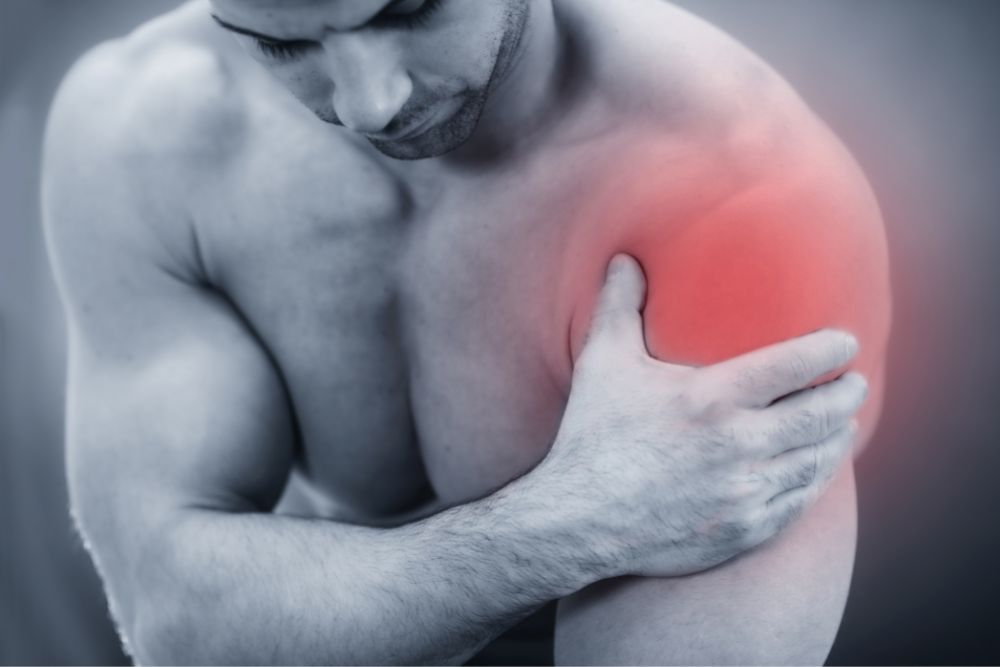Recovery From A Torn Rotator Cuff: How to Support the Healing Process
November 29th, 2022Shoulder PainOrthoHC
Which of these can put you at risk for a torn rotator cuff?
A. Repetitive lifting or overhead activities, such as pitching a baseball.
B. A traumatic injury, like a fall.
C. Normal age-related wear and tear.
D. All of the above.
If you answered “D,” you’re correct! A common injury among adults, every year, almost 2 million people visit their doctor for rotator cuff tears. This group of muscles and tendons enables you to easily lift and rotate your arm. With this injury, you may feel a dull shoulder ache at night, and your daily activities may be painful and difficult. Depending on the tear, you may only need physical therapy, or if more severe, immediate medical attention and surgery.
What Is a Rotator Cuff Tear?
Your shoulder has three bones: the upper arm bone, or humerus; the collarbone, or clavicle; and the shoulder blade, or scapula. Within the shoulder, the head of the upper arm bone fits into a shallow socket in the shoulder blade. The rotator cuff, consisting of four muscles that join together as tendons, connects the humerus to the shoulder blade.
Between the rotator cuff and the shoulder’s top bone is a bursa, or lubricating sac, that allows the rotator cuff tendons to glide freely. Should these tendons be damaged, they can partially or completely detach from the humerus., and the bursa can become inflamed and painful.
What Are Common Torn Rotator Cuff Symptoms?
While there may be no pain or symptoms at first, you will probably have a dull ache deep in the shoulder, a snapping sensation, and immediate weakness in your upper arm. Patients also typically experience pain with reaching behind the back, combing their hair, or performing other overhead activities. This pain can initially be relieved with over-the-counter medication. But as time passes, they stop working and the pain becomes more noticeable, such as when you’re lying down, or when performing normal activities. You may also have crepitus (i.e. a crackling sensation) when moving your shoulder. Having a tear in one shoulder increases your chance of development in the opposite shoulder.
Can Rotator Cuff Tears Be Treated Nonsurgically?
Many orthopedic doctors first recommend nonsurgical treatments to manage rotator cuff injuries. Conservative, nonsurgical treatments can include:
- Strengthening exercises and physical therapy can restore shoulder movement and support.
- Nonsteroidal anti-inflammatory drugs (NSAIDs) can reduce pain and swelling.
- Steroid injections, like cortisone, may be given.
- Topical, over-the-counter creams may provide nighttime relief, particularly those containing: capsaicin; salicylates, pain-relieving substances; counterirritants, which produce a hot or cold sensation; and anesthetics.
- Rest, with changes to sleep position(s), if needed
- Moist heat, like a hot bath, shower, or heat pack, can help loosen up your shoulder. An ice pack can reduce pain and swelling when applied to the shoulder.
- Limiting or avoiding overhead activities that cause shoulder pain.
Surgical Treatments For Torn Rotator Cuffs
In some cases, nonsurgical treatments may not be enough for a torn rotator cuff. Your doctor may recommend surgical options if:
- Nonsurgical methods fail to improve your pain.
- You are very active or need your arms for overhead work or sports.
- Your symptoms have lasted 6-12 months
- You have a large tear (more than 3 centimeters; 1 3/16 inches) and the surrounding tissue quality is good.
- Your shoulder has significant weakness and loss of function.
- Your tear was caused by a recent, acute injury.
Typically, torn rotator cuff surgery involves re-attaching the tendon to the head of the humerus. But there are various surgical options, including arthroscopic tendon repair, open tendon repair, tendon transfer, and shoulder replacement. You and our orthopedic surgeon will discuss the best procedure for your individual health needs.
Get Orthopedic Care for a Rotator Cuff Tear in Hudson County, NJ
A rotator cuff tear can be serious, requiring experienced, knowledgeable orthopedic experts. If you suspect this injury, contact The Orthopedic Health Center in Hoboken and Jersey City, NJ to schedule an appointment today.
Appointments available now.
